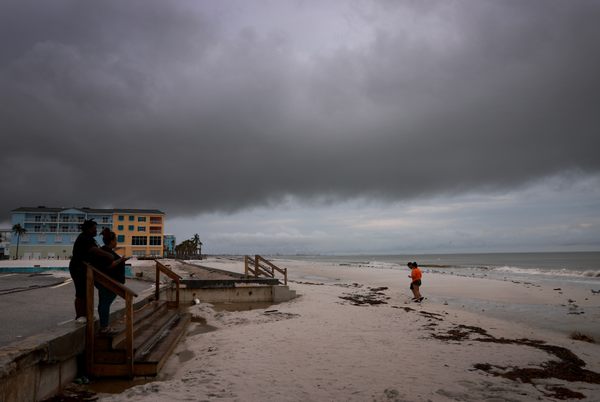Last week, Hurricane Helene carved a devastating path through 500 miles of the southeastern United States. Unlike the average hurricane or tropical storm, Helene’s worst damage was in inland mountain communities in Appalachia, where it washed away roads, bridges, and, in at least one case, an entire town. As Hurricane Milton prepares to make landfall in central Florida it brings with it what may be the worst storm surge in a century to areas that are still cleaning up debris from the last storm.
In the face of this apocalyptic-seeming destruction, stories have emerged of people coming together to support each other, rebuild what was lost, and understand the forces driving these immense, deadly phenomena.
Community Responses
Amid the heartbreak and destruction, incredible stories have emerged of communities banding together to deliver supplies, raise funds, and rescue both humans and animals. In Asheville, where fallen trees and debris have rendered areas inaccessible by car, mules are transporting much-needed canned food and medicine. In Tampa Bay, rescuers are saving manatees left stranded by receding floodwaters. And in Charlotte, ham radio operators have stepped in to provide emergency broadcasts and welfare checks amid cellular and internet outages. From saving a twice-displaced turtle to hikers rallying support for damaged trails, here are a few of our favorite stories highlighting the helpers. — Sam O’Brien, Gastro Obscura Senior Editor

Hurricane Helene Battered North Carolina’s Mountain Trails. Now, Mules Are Vital for Delivering Supplies
Asheville Citizen Times
Forget Cell Phones—Amateur Radio Shines in the Wake of Helene
WCNC Charlotte
On Airport Runways and in Cemeteries, Rescuers Are Helping Manatees Stranded by Hurricane Helene
Garden & Gun
Appalachian Trail Hikers Rally Support as Trail Towns Recover From Hurricane Helene
Outside
Florida Zoo Evacuates Animals Ahead of Hurricane Milton
Newsweek
Why This Is Happening
As communities from Cuba to Appalachia grapple with the aftermath of Helene, Hurricane Milton looms. On Monday, the hurricane became one of the most powerful ever documented. While its wind speeds decreased briefly on Tuesday, it regained Category 5 strength as it approached Florida’s Gulf Coast, including areas still reeling from Helene. Milton continues to be “an extremely dangerous storm,” according to the National Hurricane Center, but it’s not an act of God—or a big shock to climate scientists.

As detailed in Vox, Milton exploded in size and ferocity thanks to extremely warm waters in the Gulf of Mexico. According to the Atlantic, other media outlets, and most climate scientists, climate change is the main cause of the Gulf heating up and fueling increasingly intense—and more frequent—hurricanes. Veteran Florida meteorologist John Morales was visibly emotional on a live TV segment discussing Milton’s strength and path, later explaining to Mother Jones that he was experiencing a mixture of anxiety and worry for those in harm’s way and frustration over lack of action on the climate crisis.
Milton’s track is particularly worrisome. The greater Tampa area’s geography and recent development boom make it especially susceptible to catastrophic damage from storm surge, as explained in Slate.
As millions of Americans face the daunting task of surviving the storms and their aftermath, there is another tempest churning online: a dangerous explosion of conspiracy theories that are, in many cases, disrupting relief efforts and putting lives at risk. With the U.S. presidential election less than a month away, politicians, pundits, and even pranksters are pushing false narratives about the storms and the government’s response, as detailed in Grist. The Federal Emergency Response Agency has been so overwhelmed by the disinformation, according to NPR, that it has set up a response page aimed at debunking many of the baseless claims. That response page requires time and resources that could have gone toward actual disaster relief work at a time when FEMA is critically understaffed and underfunded. As Mother Jones reported on Monday, the agency needs some relief of its own—but it appears unlikely that Congress will meet to consider approving much-needed funding until after the November 5 election.
Atlas Obscura is proud to be a part of the Climate Desk collaboration, along with Mother Jones, Grist, and many of the other outlets mentioned above. We encourage you to stay up to date on their coverage as this fluid situation continues to evolve. — Gemma Tarlach, Senior Editor and Writer

How to Think About Tourism
In the wake of Hurricane Helene, and with Hurricane Milton bearing down, many travelers are likely reconsidering their plans to visit the Southeast in the near future. After all, planning a vacation to a region affected by political upheaval or natural disaster can seem both unwise and insensitive.
However, as Jen Murphy writes in this article from Outside, places that rely on the tourism industry are often hit with a one-two punch: first, a disaster strikes, and then visitors stop coming, “often when local communities need tourism dollars most.” Murphy urges travelers to thoughtfully consider how their presence—and their tourism dollars—might impact both affected and unaffected areas, and to reach out to locals for their insights on visiting. — Anne Ewbank, Gastro Obscura Associate Editor

